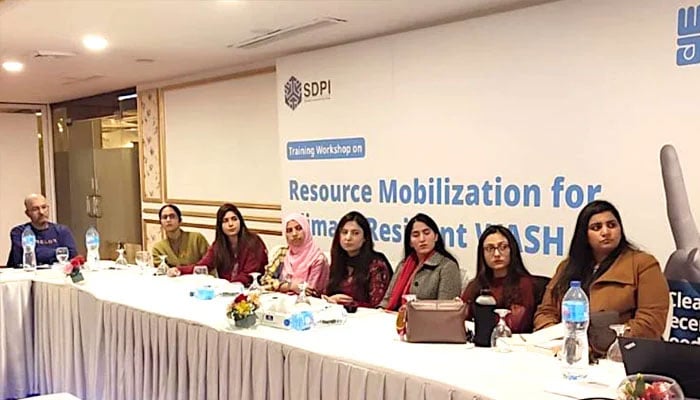Aligning district-level development steps with global SDGs discussed
LAHORE: A consultation titled ‘A Dialogue on SDGs Alignment’ was held at The Urban Unit as part of the Chief Minister District Sustainable Development Goals (CMD-SDGs) Programme.
The session brought together policymakers, researchers, and sectoral representatives to deliberate on aligning district-level development initiatives with the global SDGs. The event started with opening remarks by Ahmar Sohail Kaifi, Additional Secretary (Development), Local Government & Community Development Department (LG&CDD), who reaffirmed the Punjab government’s commitment to integrating SDG principles into local planning and execution frameworks.
Abid Hussaini, Project Team Lead for the Third-Party Validation (TPV) of SDGs, delivered a comprehensive presentation on the validation methodology, interim findings, and key insights gathered from various sectors and administrative divisions. His presentation laid the groundwork for a data-driven dialogue focused on measurable progress and improved accountability.
Dr Nousheen Zaidi, Director of the Action Research Collective and Professor at the Gene Lab, Punjab University, highlighted ARC’s role in revalidating the findings of The Urban Unit. She discussed the factors influencing the quality of CMD-SDG schemes, regional disparities in performance, and the reliability of existing performance indicators.
Dr Zaidi concluded that ARC’s results are largely aligned with The Urban Unit’s assessments, lending further credibility to the validation process. Dr Kaisar Bengali, Consultant for the CMD-SDGs Programme, shared key findings from his visits to Sialkot and Rawalpindi, highlighting the need for stronger strategic planning and improved systemic processes in development schemes. He noted that while construction quality seems adequate, a more balanced bottom-up approach is crucial. He also discussed how PC-I documents flow through various administrative tiers from the grassroots level.
Infrastructure and water challenges directly impact daily life, poor planning leads to unsafe roads, inadequate drainage, and limited water access for families. In recognition of these human-centered issues, the session concluded with a robust Q&A featuring representatives from LG&CDD, PHED, Wasa, C&W, and the School Education Department. Stakeholders shared feedback, discussed challenges, and offered sector-specific insights. This dialogue represents a crucial move toward a more collaborative and evidence-based approach to sustainable development in Punjab’s districts.
-
 What You Need To Know About Ischemic Stroke
What You Need To Know About Ischemic Stroke -
 Shocking Reason Behind Type 2 Diabetes Revealed By Scientists
Shocking Reason Behind Type 2 Diabetes Revealed By Scientists -
 SpaceX Cleared For NASA Crew-12 Launch After Falcon 9 Review
SpaceX Cleared For NASA Crew-12 Launch After Falcon 9 Review -
 Meghan Markle Gives Old Hollywood Vibes In New Photos At Glitzy Event
Meghan Markle Gives Old Hollywood Vibes In New Photos At Glitzy Event -
 Simple 'finger Test' Unveils Lung Cancer Diagnosis
Simple 'finger Test' Unveils Lung Cancer Diagnosis -
 Groundbreaking Treatment For Sepsis Emerges In New Study
Groundbreaking Treatment For Sepsis Emerges In New Study -
 Roblox Blocked In Egypt Sparks Debate Over Child Safety And Digital Access
Roblox Blocked In Egypt Sparks Debate Over Child Safety And Digital Access -
 Savannah Guthrie Addresses Ransom Demands Made By Her Mother Nancy's Kidnappers
Savannah Guthrie Addresses Ransom Demands Made By Her Mother Nancy's Kidnappers -
 OpenAI Reportedly Working On AI-powered Earbuds As First Hardware Product
OpenAI Reportedly Working On AI-powered Earbuds As First Hardware Product -
 Andrew, Sarah Ferguson Refuse King Charles Request: 'Raising Eyebrows Inside Palace'
Andrew, Sarah Ferguson Refuse King Charles Request: 'Raising Eyebrows Inside Palace' -
 Adam Sandler Reveals How Tom Cruise Introduced Him To Paul Thomas Anderson
Adam Sandler Reveals How Tom Cruise Introduced Him To Paul Thomas Anderson -
 Washington Post CEO William Lewis Resigns After Sweeping Layoffs
Washington Post CEO William Lewis Resigns After Sweeping Layoffs -
 North Korea To Hold 9th Workers’ Party Congress In Late February
North Korea To Hold 9th Workers’ Party Congress In Late February -
 All You Need To Know Guide To Rosacea
All You Need To Know Guide To Rosacea -
 Princess Diana's Brother 'handed Over' Althorp House To Marion And Her Family
Princess Diana's Brother 'handed Over' Althorp House To Marion And Her Family -
 Trump Mobile T1 Phone Resurfaces With New Specs, Higher Price
Trump Mobile T1 Phone Resurfaces With New Specs, Higher Price




